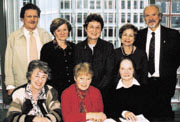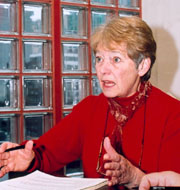
The
seniors' committee stands still for a photo. In the front row are Nora
Bernier, Sylvia de Niverville (chair) and Shirley Young-Lehman, and
in the back row, Art Bartnicki, Natalie Maksymiw, Lila Lesk, Lila Erdile
and Edward Biernet. Missing from the photo is past chairman Ashley McGain.

Sylvia de Niverville.
|
by Nora Bernier
Enrolment in the Senior Non-Credit
Program has reached an all-time high — more than 300 participants.
The idea of including seniors in the Concordia community goes back to
1976, when a committee was created to look at the possibility of admitting
people 60 years of age or older to the Faculty of Arts and Science on
a non-credit basis. However, in spite of much discussion, the project
never got off the ground.
Then, in the fall of 1983, thanks to the initiative of independent student
Willie Schiff, the project was given new life.
A Polish immigrant, Schiff began taking courses at Sir George Williams
at the age of 68. In 1986, he became a full-time student, earning his
Bachelor of Arts degree in 1988 at the age of 85. He was a familiar figure
around the campus, where he spent a good deal of time in his office organizing
activities for his over-50s social club, the Sparklers.
The Senior Audit Program began in 1983 as a pilot project of the Centre
for Mature Students. For a nominal fee, seniors aged 60 and over could
follow undergraduate courses on a non-credit basis in the Faculty of Arts
and Science, as well as a few courses in the Faculty of Fine Arts.
The program was met with great enthusiasm. Professor Jack Ornstein, of
the Philosophy Department, said that the seniors were “attentive,
earnest, hardworking, knowledgeable and willing participants.”
By the 1990s, enrolment had dropped, not for lack of enthusiasm, but due
to a lessening of course availability and increased competition from other
programs in the city. But in the mid-1990s, it picked up again.
In 1995, the age restriction was dropped from 60 to 55, and for clarity,
the name of the program was changed from Senior Audit Program to Senior
Non-Credit Program. Seniors not only listen to lectures, they participate
in class discussions and often in writing assignments, though they are
not obliged to write assignments or sit examinations.
Seniors make a significant contribution to the university through their
years of experience and reflection. Younger students can gain a great
deal from the presence of these older students. In addition, two $2,000
entrance bursaries named after Thomas J. Madden, a founding member, and
a $500 scholarship named after William Schiff for seniors pursuing a degree,
are available.
For their part, the seniors love it. Shirley and Eugene Lehman, who have
participated in at least three other programs in the Montreal area, say
that they have enjoyed meeting like-minded seniors who want to keep intellectually
stimulated.
“We are in classes with much younger undergraduate students, as well
as seniors,” said Shirley. “We thoroughly enjoy the ambience.”
Lila Lesk has taken courses over 10 years. “Some of them have motivated
and informed my travel to other countries. I love being in class with
undergraduate students. They are intelligent, serious, and aware of the
world. In classes where there is interaction, they make seniors feel welcome.”
Lila Erdile said, “Although I have a graduate degree, there are always
many interesting things to learn. The Program has enabled me to do this
without paying costly fees and without the stress of writing exams.”
When Edward Biernat took early retirement, he remembers asking himself,
Why not participate, learn and feel great? Now on the Seniors Committee,
he has been both an independent student studying for credit, and a Senior
Non-Credit student.
Often, seniors who start in the Non-Credit Program gain confidence and
switch to a credit program. These students exemplify the type of senior
who is dedicated to enriching their retirement years in the pursuit of
learning. Who can be more dedicated than those who attend classes out
of interest alone?
Nora Bernier is on the
Senior Students Committee.
|
|
|



